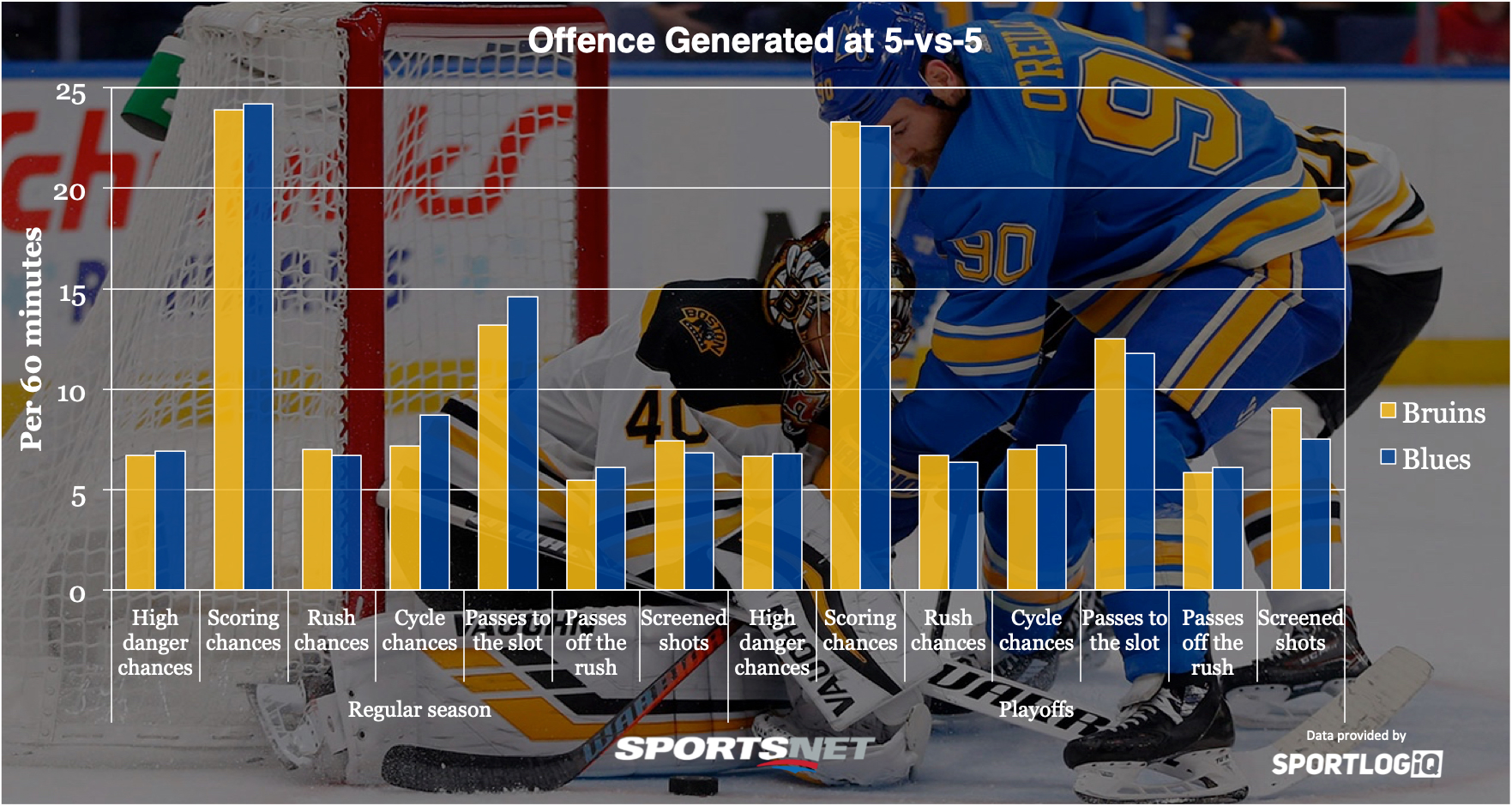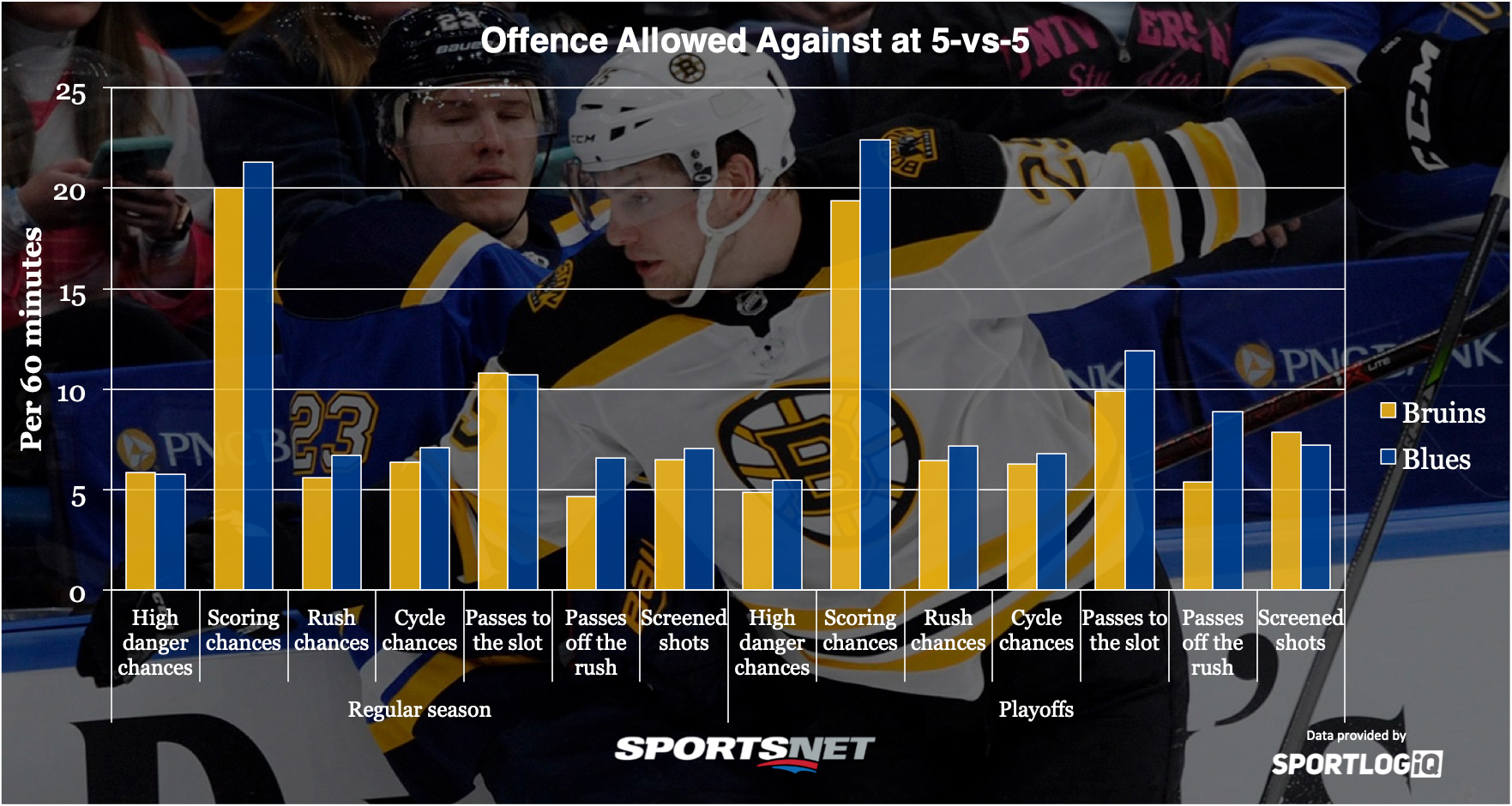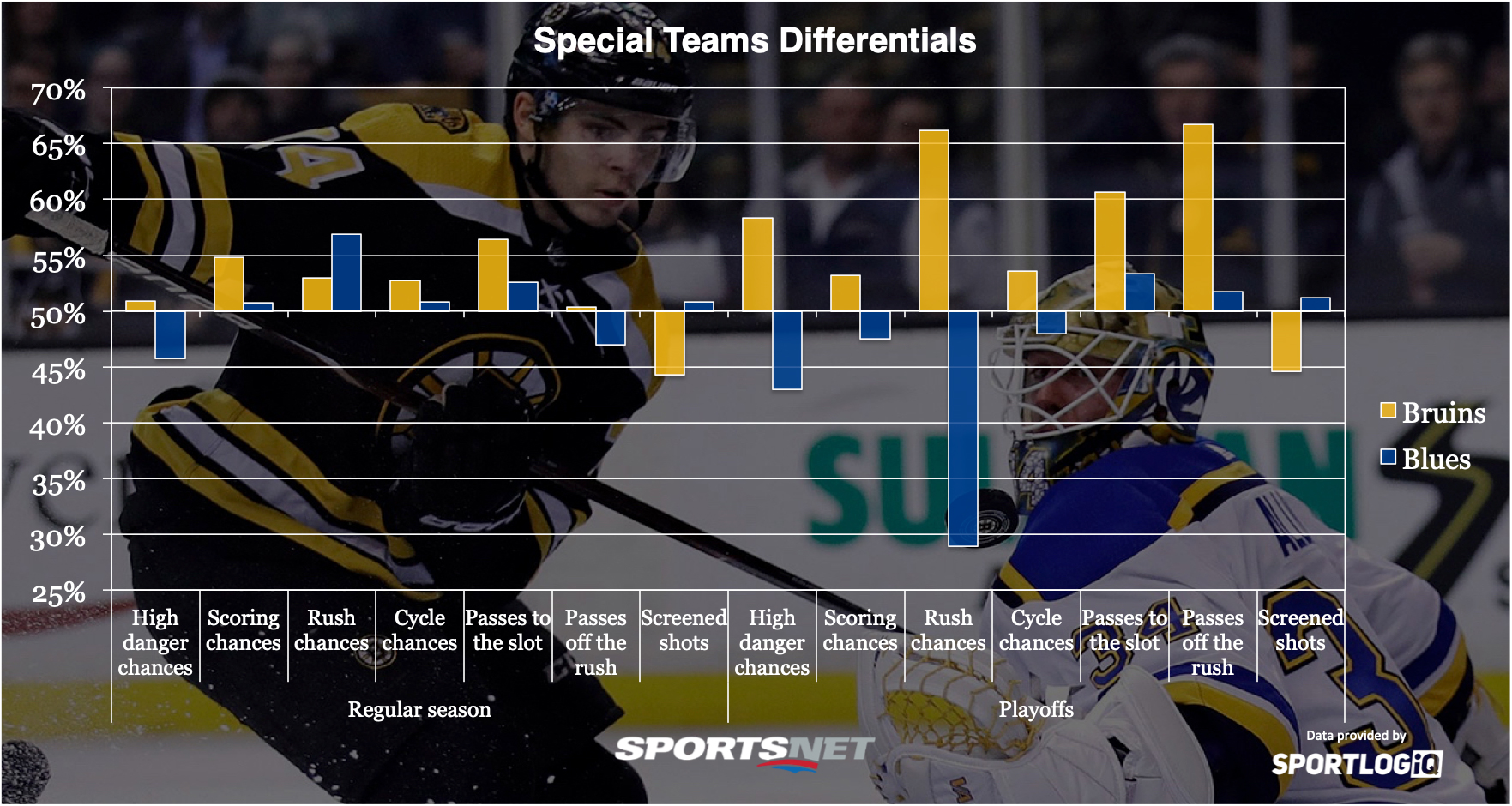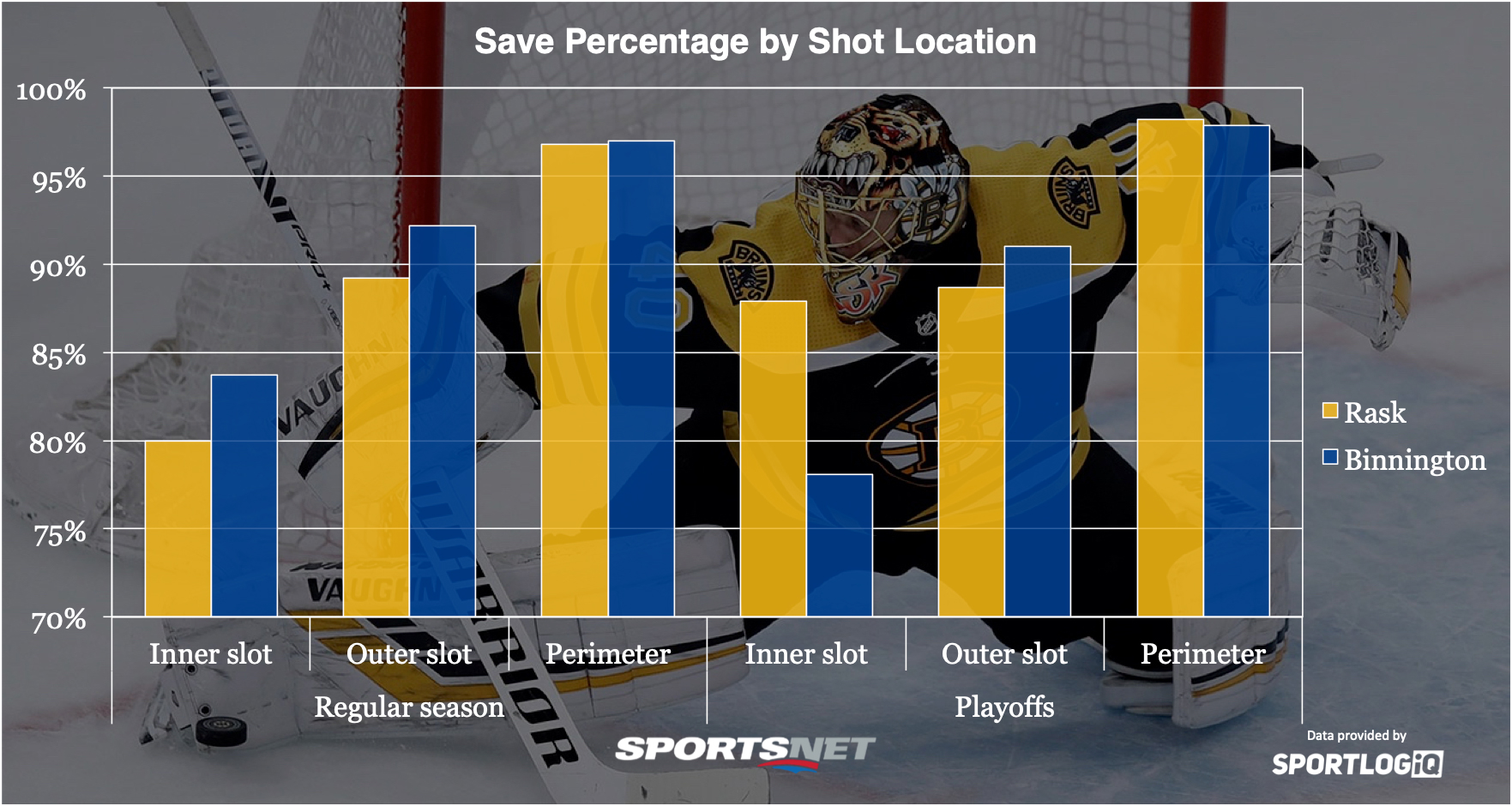As each round of the NHL playoffs has ended, we’ve recapped how the winners got where they were. So, we’ve examined how the Bruins and Blues got through Round 1, Round 2 and Round 3, but before the Stanley Cup Final begins we’re going to have to look at more than that.
In order to truly get a picture of how these teams match up against each other, we’re going to have to look at the playoffs as a whole and even the regular season, and see who has the advantage in specific areas of the game.
The areas we’ll look at are 5-vs-5 offence, 5-vs-5 defence, special teams, and goaltending. After we break down each area, we’ll give one team the edge, and by the end we’ll find out which team is more likely to take home the Stanley Cup.
5-VS-5 OFFENCE

When you’re looking for gaps between teams to analyze who has the advantage, this kind of result is… annoying.
The Bruins and Blues throughout the regular season and playoffs have been generating offence in very similar ways at 5-vs-5, and at very similar rates. There’s barely a difference between them in any category. Therefore, in order to figure out which team is better on balance we have to figure out what to value more. The regular season is longer, so despite the recency bias most of us have that gravitates towards highly valuing playoff statistics, the regular season usually gives us a better idea of what to expect for performance, so we should value it slightly more even if it was a while ago now.
Overall the Blues have produced slightly more high danger chances, a good chunk more off the cycle, slightly more passes to the slot, and slightly more passes off the rush.
The Bruins have the advantage in attacking off the rush and getting screens on their shots, but on balance, does that counter the Blues’ advantage in more categories, and more important ones at that?
It’s good to get screens on shots, but it’s better to shoot from in close, and create more pre-shot movement.
It’s by a hair, but offensively, the edge goes to the Blues.
5-VS-5 DEFENCE

Similar to the offensive metrics, defensively there isn’t a ton of separation between these two teams, especially in the regular season where they were both top-three defensive teams in the league.
However the advantage is a bit more clear in this comparison, and you can see that in almost every metric the blue bar is higher than the yellow, meaning the Blues are giving up more than the Bruins are.
In the regular season the Blues actually allowed fewer high danger scoring chances and passes to the slot against than the Bruins did, but while they’ve given up significantly more against better teams in the playoffs, the Bruins haven’t. In fact the Bruins have tightened up defensively even more and shaved a completed pass to the slot per 60 off of their average in the playoffs.
The Bruins’ domination in pass defence also extends to limiting attacking teams off the rush, forcing opponents to attack in straight lines instead of going east-west, which is making things easier on Tuukka Rask.
The Bruins were the best team in the league at breaking screens in their own zone in the regular season, but have struggled a bit in the playoffs there. The focus for them in the post-season has been the net front, and it makes sense to prioritize there.
These two teams have been the two best defensive teams in the playoffs, and it’s a huge reason for why they’ve got to this point, but the Bruins are just stronger at controlling what opponents are able to do in their own zone. The edge here goes to Boston.
SPECIAL TEAMS

In the regular season the Bruins’ powerplay was good, but also pretty fortunate to get the results they were getting. As a whole, their special teams were strong but not a defining feature of their season.
In the playoffs, they’ve been bonkers. The control the Bruins have exerted on special teams have punished every team they’ve faced in these playoffs, and that should be very worrying for the Blues.
In the regular season the Blues were pretty good on special teams. They weren’t as good as the Bruins, specifically struggling a bit more on the penalty klll, but they were a net positive. In the playoffs that hasn’t been true, and they’ve really struggled while their opponent has the man advantage.
The big gap in control of rush chances is something to keep an eye on as well. The Bruins have generated an inordinate number of chances off the rush on the powerplay, something that doesn’t happen very often, and the Blues have been giving up a fair amount while shorthanded. That’s a dangerous combination that plays heavily into the Bruins’ favour.
If we were looking at the regular season only, the Bruins would have the advantage but it wouldn’t be a huge one. Looking at the playoffs, even if we value them less than the 82 games that came before, the edge here is heavily in the Bruins’ favour. Maybe some of that magic fades in the long stretch the Bruins have had off after sweeping the Hurricanes, but is that a bet you would make?
GOALTENDING

In the regular season, Jordan Binnington was superior to Rask. But in the playoffs, the two appear on the surface to be separated by a wide margin, with Rask clearly better.
The difference between the two in the playoffs comes entirely from the inner slot or high danger area, where Binnington has been league average and Rask has been brilliant.
The Bruins’ extreme control over the high danger area has helped Rask to that number, but even when the Bruins started the playoffs a little lackadaisical defensively, he was routinely holding them in games. He hasn’t faced nearly as many quality shots as Binnington has in the post-season, and that’s the difference between the best and second-best defensive team in these playoffs.
Logically it makes sense to give the edge to Rask. He has a proven track record and he’s the hot hand, but will his dominance on high danger chances hold over after a long layoff? So much of goaltending is about focus and the mentality you bring into a game, so that time off could easily throw a wrench into his game.
There’s also the regular season to look at, and while Rask was decent then, he wasn’t special. So how much of his performance in the playoffs is just a hot streak that could end at any time?
I think it would be crazy to not give Rask the advantage here heading into the series, but the margin is thinner than most will represent it as.
[snippet id=4532907]
WHO IS THE FAVOURITE?
With the Bruins holding the edge in three out of four categories, there’s not a lot of suspense here. It’s Boston, and for more than just the fact that they appear to be better on paper.
In these playoffs, for whatever reason, defence has reigned supreme. The defensive-minded Islanders took out the offensively inclined Penguins. The defensive juggernaut that is the Bruins took out the offensive powerhouse Maple Leafs in the first round. Carolina shut down Washington while the Blues took down the Sharks. Defence is winning.
Keeping that in mind, with the two best defensive teams in the playoffs being the last two teams remaining, you have to think that the best defensive team is going to be the one that ultimately wins, and that’s the Boston Bruins.
[relatedlinks]







